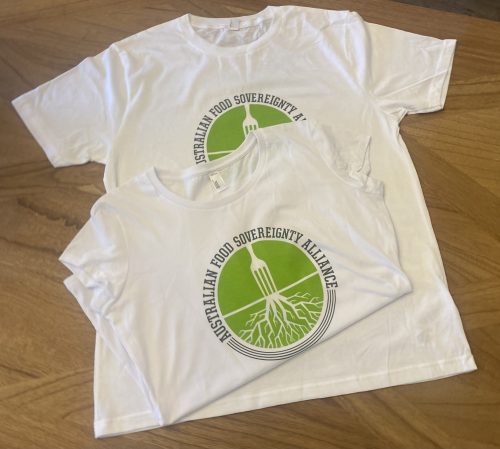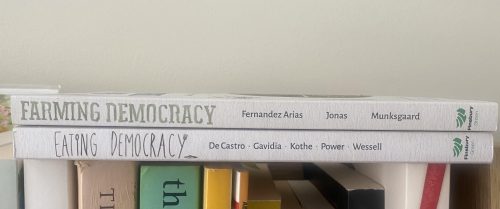-
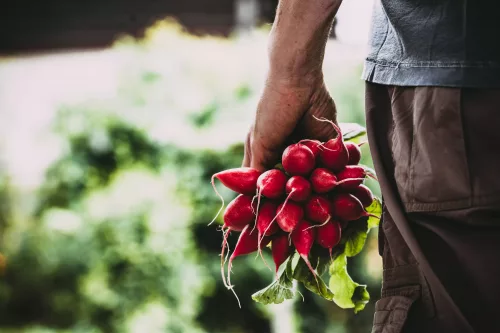 AFSA is a non profit organisation working for Food Sovereignty for All Australians. Help us continue the development of the Peoples' Food Plan by donating today. AFSA is a group of dedicated volunteers that run on active optimism and food that we fight for, with one part-time paid General Coordinator. Donations will go toward the final production of the Plan, payment for First Peoples' contributions and to getting the revised Peoples' Food Plan into the hands of community organisations and Governments across Australia. Every little bit counts! Donations are not tax deductible.
AFSA is a non profit organisation working for Food Sovereignty for All Australians. Help us continue the development of the Peoples' Food Plan by donating today. AFSA is a group of dedicated volunteers that run on active optimism and food that we fight for, with one part-time paid General Coordinator. Donations will go toward the final production of the Plan, payment for First Peoples' contributions and to getting the revised Peoples' Food Plan into the hands of community organisations and Governments across Australia. Every little bit counts! Donations are not tax deductible. -
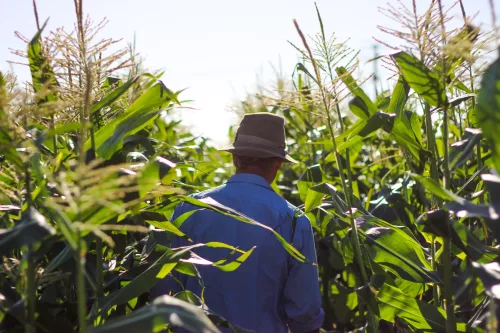
The time to defend the growing movement of small-scale food producers has come.
Despite growing concerns about the nutrition, safety, and ethics of the food we eat, some regulators are making it harder for Australian small-scale farmers to produce ethical, ecologically-sound, nutritious, and delicious food for their communities. The issues include: communities who want access to raw milk from local dairies, farms doing on-farm processing facing unfair and inconsistent regulation of their facilities, and many others grappling with outdated and illogical definitions of ‘intensive’ and ‘extensive’ livestock in local planning schemes that see a farm with a few hundred chickens out on the paddocks subjected to the same requirements as one with 10,000 birds in sheds. Donations are not tax deductible. -
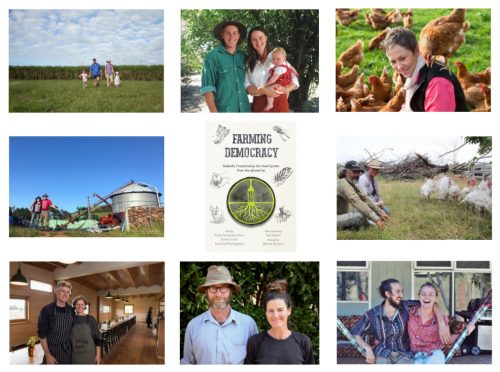
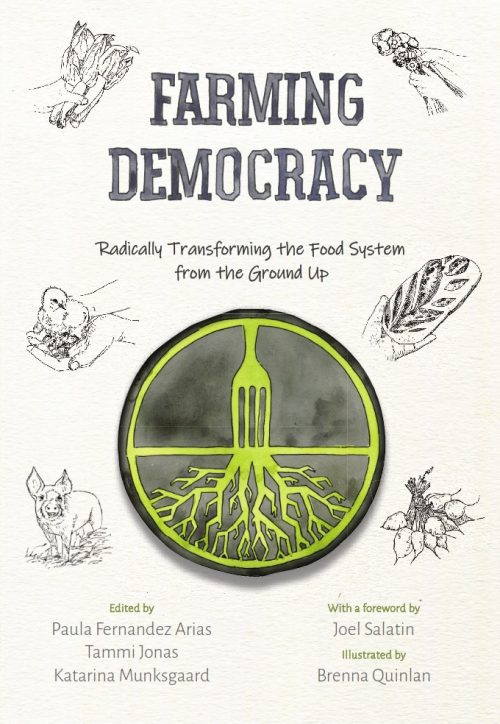 FARMING DEMOCRACY opens the farm gates, it opens the books and ledgers, and aims to open our hearts and minds to the farming community. This book lets the world see the true work, rewards, and costs of farming! Farming Democracy tells the story of family farms doing things differently. They are working for a ‘new normal’ in agriculture that is fair to soil, water, animals, and people. These farmers are building regenerative, agroecological systems that are viable in an epoch that has seen a sharp decline in the number of farms globally.
FARMING DEMOCRACY opens the farm gates, it opens the books and ledgers, and aims to open our hearts and minds to the farming community. This book lets the world see the true work, rewards, and costs of farming! Farming Democracy tells the story of family farms doing things differently. They are working for a ‘new normal’ in agriculture that is fair to soil, water, animals, and people. These farmers are building regenerative, agroecological systems that are viable in an epoch that has seen a sharp decline in the number of farms globally. -
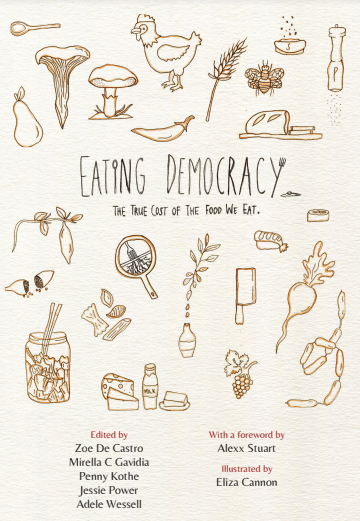 PRE-ORDER YOUR COPY OF EATING DEMOCRACY BEFORE ITS OFFICIAL LAUNCH ON 21 OCTOBER. Eating Democracy is the story of eaters from diverse backgrounds and locations. Some of them are city dwellers, others remote, some on low incomes, single or with large families to feed. Some are students, others work in hospitality or the arts, are academics or have professional careers. Some are couples with more choice, higher incomes, or living in areas where choice is more abundant. They each have different skills, abilities and choices when it comes to food. However, the eaters in this book share a common theme of helping to transform the food system as individuals determined to make a change. These are eaters who care about the food they consume, where they source it from, how it is grown, prepared and eaten.
PRE-ORDER YOUR COPY OF EATING DEMOCRACY BEFORE ITS OFFICIAL LAUNCH ON 21 OCTOBER. Eating Democracy is the story of eaters from diverse backgrounds and locations. Some of them are city dwellers, others remote, some on low incomes, single or with large families to feed. Some are students, others work in hospitality or the arts, are academics or have professional careers. Some are couples with more choice, higher incomes, or living in areas where choice is more abundant. They each have different skills, abilities and choices when it comes to food. However, the eaters in this book share a common theme of helping to transform the food system as individuals determined to make a change. These are eaters who care about the food they consume, where they source it from, how it is grown, prepared and eaten. -
 PRE-ORDER YOUR COPY OF EATING DEMOCRACY BEFORE ITS OFFICIAL LAUNCH ON 21 OCTOBER. Eating Democracy is the story of eaters from diverse backgrounds and locations. Some of them are city dwellers, others remote, some on low incomes, single or with large families to feed. Some are students, others work in hospitality or the arts, are academics or have professional careers. Some are couples with more choice, higher incomes, or living in areas where choice is more abundant. They each have different skills, abilities and choices when it comes to food. However, the eaters in this book share a common theme of helping to transform the food system as individuals determined to make a change. These are eaters who care about the food they consume, where they source it from, how it is grown, prepared and eaten.
PRE-ORDER YOUR COPY OF EATING DEMOCRACY BEFORE ITS OFFICIAL LAUNCH ON 21 OCTOBER. Eating Democracy is the story of eaters from diverse backgrounds and locations. Some of them are city dwellers, others remote, some on low incomes, single or with large families to feed. Some are students, others work in hospitality or the arts, are academics or have professional careers. Some are couples with more choice, higher incomes, or living in areas where choice is more abundant. They each have different skills, abilities and choices when it comes to food. However, the eaters in this book share a common theme of helping to transform the food system as individuals determined to make a change. These are eaters who care about the food they consume, where they source it from, how it is grown, prepared and eaten. -

 FARMING DEMOCRACY opens the farm gates, it opens the books and ledgers, and aims to open our hearts and minds to the farming community. This book lets the world see the true work, rewards, and costs of farming! Farming Democracy tells the story of family farms doing things differently. They are working for a ‘new normal’ in agriculture that is fair to soil, water, animals, and people. These farmers are building regenerative, agroecological systems that are viable in an epoch that has seen a sharp decline in the number of farms globally.
FARMING DEMOCRACY opens the farm gates, it opens the books and ledgers, and aims to open our hearts and minds to the farming community. This book lets the world see the true work, rewards, and costs of farming! Farming Democracy tells the story of family farms doing things differently. They are working for a ‘new normal’ in agriculture that is fair to soil, water, animals, and people. These farmers are building regenerative, agroecological systems that are viable in an epoch that has seen a sharp decline in the number of farms globally.
